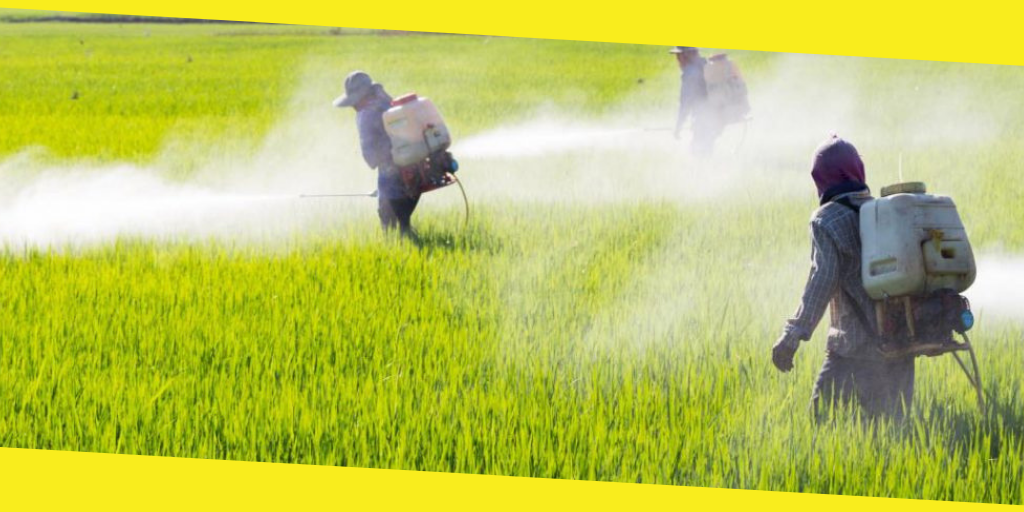7 Common Types of Pesticides to Avoid at All Costs

Around 200,000 people die each year due to exposure to toxic pesticides. Between 2006 and 2010, there were 130,136 calls made to poison control centers. 17.8 percent of the pesticide poisoning cases are treated in health care facilities.
Although pesticides lead to an increase in food production levels, its impact on the environment and human health makes the UN label it as catastrophic.
Scientists associate toxic pesticides to a variety of serious illnesses. They include Alzheimer’s, cancer, and Parkinson’s disease. There are other effects such as sterility, congenital disabilities, and hormonal disruptions.
Even though not all types of pesticides are harmful, you should exercise caution when dealing with them.
Here are the top 7 pesticides you should avoid by all means.
1. Atrazine
Atrazine is an agricultural weed killer that you can use on farms, near highways, and railroads. It is an odorless white powder that readily dissolves in water.
The weed killer contaminates water supplies in its area of use.
People living in areas with atrazine-contaminated water exhibit increased levels of the risk of cancer. The women show altered menstrual cycles and shorter pregnancies.
In the US, farmers use millions of pounds of this weed killer every year. They are more likely to experience the harmful effects of this toxic chemical.
2. Paraquat
Paraquat is a toxic chemical whose primary use is to control weeds and grass. Europe and China banned the use of this chemical. It is still in use in the USA but under restricted use.
The chemical became famous due to the 1970s vote to use it on the marijuana farms of Mexico. There was an increase in concern about paraquat contaminated marijuana circulating in the US.
Studies done on the effects paraquat has on the health of humans show a link to Parkinson’s disease. Even though the long term effects are still debatable, it is poisonous when you ingest it.
Several suicidal deaths around the world are due to the use of the chemical.
3. Neonicotinoids
Scientists studying the decline in the bee colonies identified neonicotinoids as the main suspects. A decrease in the number of bees affects plants since they play a critical role in the pollination process.
As a result, the European Union voted to ban the use of three neonicotinoids. They include clothianidin, thiamethoxam, and imidacloprid.
Thiacloprid, another neonicotinoid, was seen to impair the ability of bees to search for nectar and pollen.
4. Chlorpyrifos
The pesticide was created in the 1960s. Farmers use it in farms that contained almonds, cotton, corn, and oranges.
The chemical is beneficial when dealing with pest infestation. However, it carries serious consequence to the users.
It may cause direct users to have headaches, nausea, blurred vision, and fatigue.
Research indicates that it affects pregnant women, leading them to have a child with an increased risk of having autism.
Women with low to moderate levels of exposure while pregnant gave birth to children with lower IQs and memory problems. The chemical also has links to respiratory paralysis and ADHD.
5. Glyphosate
You can find glyphosate in Monsanto’s Roundup. Several countries have banned the use of this pesticide. Austria is the latest to execute the ban.
In the US, more than 13,000 people filed lawsuits against the company. They claim that Roundup causes non-Hodgkin lymphoma. You can get more information on the Monsanto Roundup lawsuits here.
Scientists also suspect glyphosate to be the lead cause of kidney diseases. This was after farm workers in Central America, Sri Lanka and India exhibited the problem.
6. 1,3-dichloropropene
It is a fumigant used to get rid of pathogens in the soil before planting. Most farmers use it in farms that grow potatoes, vegetables, carrots, and cotton.
The European Union banned this chemical, but it is still prevalent in the USA.
Scientists found that it contaminates the air and groundwater around the farm in use.
Research reveals that it causes cancer in various animals. It was then labeled to be carcinogenic.
The chemical also has damaging effects on the kidney and causes reproductive problems. It also leads to respiratory ailments and irritates the eyes and the skin.
You can find it in the market under the name Telone. It is sometimes used together with Chloropicrin to improve its effectiveness.
Chloropicrin is a stronger carcinogen.
7. Metam-sodium
Metam-sodium is an ingredient you can readily find in various pesticides that control soil pathogens. It is mainly used before planting.
The US Environmental Protection Agency declared Metam-sodium to be a possible carcinogen in 2004. The chemical is highly toxic to humans.
France is the latest country to ban all products that contain Metam-sodium. This move came after several farmers and people neighboring farms that use the chemical exhibited respiratory intoxication.
Several side effects follow after using the chemical. They include vomiting, thyroid damage, difficulty in breathing, hormone disruption, and congenital disabilities.
How do Pesticides Affect Human Health?
Toxic pesticides are not only harmful to the environment but can also affect your health.
There are several ways you can get exposure to toxic pesticides. The primary method is through the consumption of food from farms that use the chemicals.
Babies can also get exposure by drinking the contaminated breast milk of the mother.
Although the risks of pesticides are more significant for children, they are not the only ones in danger. Workers on the farms routinely get sick due to the exposure of toxic chemicals.
Many studies have linked various pesticides to cancer, ADHD, and Alzheimer’s disease. They can also affect the reproductive system and cause pregnant women to have congenital disabilities.
What Next after Ban on Various Types of Pesticides?
Although several countries are putting an effort to ban toxic pesticides, various farm groups question what will happen without them. Many people argue that without alternatives, there will be a decrease in crop yields.
Even so, this creates an opportunity for farmers to embrace organic farming techniques that do not require the use of chemical pesticides. Adopting proper farming techniques can boost overall human health.
Now that you know more about the various types of pesticides, it is up to you to make healthy choices that will bolster a healthy lifestyle for you and your family.
Continue reading our blog to learn more about pesticides.
Recommended For You
Tips To Help You Choose A Men’s Wallet
Most Inside
Most Inside offers high-quality recommendations and valuable updates to enhance all aspects of your life, providing premium guidance and enriching experiences.




